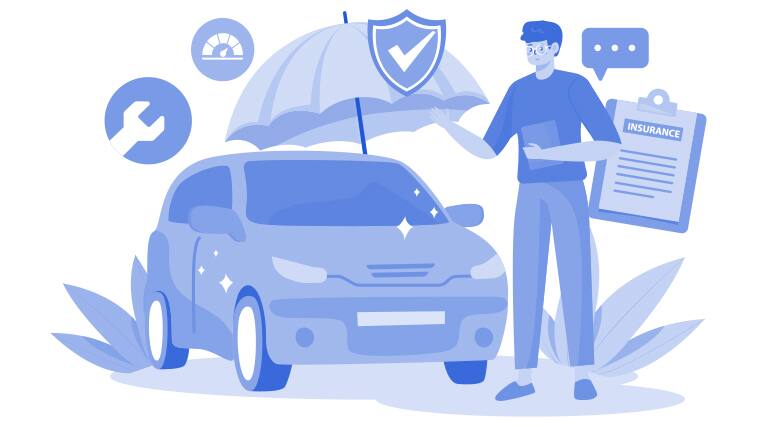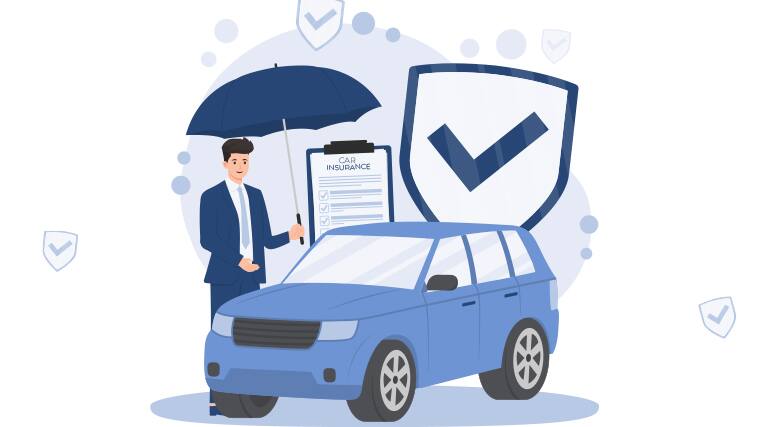-
Renew policy in 2 minutes*
-
21+ Insurers to choose
-
1.2Cr+ Vehicles Insured

-
Home

-
Motor Insurance

-
Car Insurance

-
Articles - CI

- Car Insurance for Self-Driving or Autonomous Vehicles
Car Insurance for Self-Driving or Autonomous Vehicles
Autonomous or self-driving vehicles are the future, as all major automobile manufacturers are progressing rapidly in this field. There is a rising demand for self-driving cars as they feature the latest technologies to increase passenger safety and mobility. However, like all motor vehicles, autonomous cars also need car insurance that provides coverage against unforeseen risks like road accidents, injuries, and vehicle damage. Please read the information below to learn more about self-driving cars and why they need car insurance.
How do Self-driving/Autonomous Cars Work?
Unlike normal vehicles, autonomous cars don't even require driving as they function with a mix of the newest tech, such as Artificial Intelligence, sensors and cameras. The car pilots itself through traffic with data from these technologies without any input from a human driver.
Driverless Car Insurance
Unlike conventional cars, driverless cars do not require human intervention, so traditional car insurance policies are not a viable option. In India, car insurance providers must rethink their existing policies and risk factors to stay ahead of the game and be ready to meet the insurance demands of driverless cars.
-
Absence of Specific Regulatory Framework
The Motor Vehicles Act, 1988 of India as of now, does not contain regulations regarding autonomous vehicles and even regulators such as the Insurance Regulatory and Development Authority of India (IRDAI) have not formed any exclusive guidelines on insurance of autonomous vehicles.
-
Shift in Liability from Driver to Manufacturer
Worldwide, discussions are underway to shift the accident liability from drivers/owners to manufacturers or software companies in case of autonomous vehicles. However, in India, there does not exist any such shift yet and the driver/owner remains responsible for accidents.
-
Cybersecurity and Data Privacy Concerns
The high connectivity of autonomous vehicles renders them vulnerable to cyber-attacks. Recognising this, India is introducing AIS 189, a cybersecurity standard aimed at protecting vehicles from cyberattacks.
-
Emergence of Usage-Based Insurance Models
The IRDAI has permitted insurers to introduce innovative add-on covers like 'Pay As You Drive' and 'Pay How You Drive'. These models base premiums on vehicle usage and driving behaviour, which could be particularly relevant for autonomous vehicles.
-
Need for New Risk Assessment Models
Conventional underwriting is based on drivers' conduct and accident record that may not hold true for self-driving cars. New risk assessment models need to be created by insurers that take into account attributes like software quality, sensor accuracy and even cybersecurity.
-
Potential for Lower Premiums with AVs
Autonomous vehicles (AVs) have the potential to reduce human errors, majorly due to which accidents happen. With these vehicles in India, it could lower accident rates, and as a consequence, insurance premiums. However, this depends on the road & traffic conditions, which still pose challenges in India.
Car Insurance Premium Calculation for Autonomous Cars
Insurance premium calculation for driverless cars in India is still a hypothetical exercise, as fully autonomous vehicles are not yet available in India. But with Insurance Regulatory and Development Authority of India (IRDAI) now bringing technology-driven insurance models, the stage is set for future premium formulation to be based on autonomous cars.
-
Vehicle Specifications and Insured Declared Value (IDV)
- Premiums are influenced by the car's make, model, variant and the cost of repair or replacement. The car's Insured Declared Value (IDV) also influences premium calculation.
- Advanced autonomous vehicles, equipped with sophisticated technologies like LiDAR, AI processors and high-end sensors, are likely to have higher IDVs, leading to increased premium amounts.
-
Level of Automation
Autonomous vehicles are categorised into levels based on their automation capabilities and need for driver interference. These vehicles are categorised as
- Level 1 - Has features like Cruise Control & Navigation.
- Level 2 - Includes additional features like Speed Control, Park Assist, etc.
- Level 3 - Partial self-driving(subject to certain conditions)
- Level 4 - Self-driving on city streets and highways. Drivers can take control at any time.
- Level 5 - Fully automated. May not even require a steering wheel and acceleration/braking pedals.
-
Usage-Based Insurance (UBI)
- UBI models, such as 'Pay As You Drive' (PAYD) and 'Pay How You Drive' (PHYD), utilise telematics devices or mobile apps to monitor parameters, such as kilometers driven, speed & braking patterns, and acceleration.
- For autonomous vehicles, such data can help insurers assess risk more accurately and offer personalised premiums.
-
Tech Features and Safety Systems
- Advanced Safety Features - such as lane-keeping assist, automatic emergency braking, and adaptive cruise control - can help reduce accidents.
- Car Insurance companies might offer reduced premiums if the vehicle has these devices, considering the lower risk.
-
Repair and Maintenance Costs
- Autonomous vehicles, with their complex systems and components, may incur higher repair or maintenance costs and need expert technicians.
- These potential expenses are taken into account by insurers when they set premiums in order to provide sufficient coverage.
-
Data Privacy and Cybersecurity Risks
- Autonomous vehicles rely heavily on data exchange and connectivity, making them susceptible to cyber threats.
- Cybersecurity features and vulnerabilities for the car might be taken into account by insurers for deciding premiums.
Cons Associated with Insuring Autonomous Vehicles
Insuring autonomous vehicles in India is a complicated matter as insurance providers have to consider technological, legal and infrastructural factors. Some issues that insurance providers can likely face for providing insurance for autonomous cars are:
- Ambiguity in Liability: Autonomous vehicles are not a separate entity under the Motor Vehicles Act 1988. In case an accident occurs, there is an ambiguity about who must be liable - the vehicle owner, the car manufacturer or the software provider.
- High Repair and Maintenance Costs: Autonomous cars are packed with high-tech components such as sensors and AI systems. These components are expensive and are often difficult to procure for repair or replacement.
- Cybersecurity and Data Privacy Risks: Driverless vehicles are susceptible to hacking because they require uninterrupted access to the internet. Potential threats include hacking, data breach and unauthorised control of the vehicle.
- No History to Assess Risk: Regular car insurance works by using data and algorithms to determine the risk to set the premium rates. The relatively new nature of autonomous vehicles means there isn't enough historical data about these cars which makes premium calculation difficult for insurers.
- Traffic Regulation and Infrastructure: India's current road and traffic infrastructure is not ideal for autonomous vehicles. Also, there are no specific regulations governing autonomous vehicles. This creates uncertainty for insurer providers and manufacturers.
- Economic Impact on Insurers: If accident culpability shifts away from drivers to driverless cars, insurers potentially could see fewer claims and a decreased revenue stream. This could potentially change the market from a model of personal auto insurance to one of product liability insurance.
Conclusion
Autonomous vehicles are the future of driving as they offer many advantages. Commuters can travel safely without physical strain as these cars do not need human intervention. This possibility is an excellent advantage for people with mobility issues due to physical limitations. However, like all vehicles on the road, autonomous cars risk getting damaged in a road accident or due to a mechanical breakdown. A comprehensive car insurance policy offering financial coverage for unexpected incidents can benefit the car owner.
FAQs
-
Q1: Are self-driving cars available in India?
Ans: No. Self-driving cars are still being developed in India and are not yet available in the market. Automobile companies are still researching and testing prototypes for the Indian market. -
Q2: Which technologies feature in self-driving cars?
Ans: Self-driving cars feature advanced technologies that allow the car to drive safely without human intervention. Latest tech features like integrated AI, sensors, and cameras are embedded in self-driving cars. -
Q3: Is special infrastructure required for self-driving cars?
Ans: Yes. Self-driving cars must be driven on planned roads with clear markings so that the vehicle's AI and computing system can select the best driving mode and speed for the journey. The streets must also be digitally mapped so that the car can assess the ideal route. As most Indian roads do not meet these requirements, it is ideal to build the proper infrastructure before introducing autonomous vehicles in the automobile market. -
Q4: Who becomes liable if a self-driving car gets in a road accident?
Ans: According to the Indian Motor Vehicle Act, the car owner is liable to pay for the damages caused by the insured car. As there are no special provisions or laws for autonomous vehicles in India, this liability clause must also be assumed for self-driving cars. -
Q5: Can self-driving cars be hacked?
Ans: Yes. As the technologies used in self-driving cars are still in the development phase, a great deal of research and experimentation needs to be done. Technically, it is possible to hack a self-driving car. However, there are no credible instances of such an event occurring in India, as autonomous vehicles are unavailable in the market.
Find similar car insurance quotes by body type
































Explore More Under Car Insurance
- Motor Insurance
- Car Insurance
- Zero Dep Car Insurance
- Compare Car Insurance
- Car Insurance Calculator
- Third Party Insurance
- Comprehensive Car Insurance
- IDV Calculator
- Car Insurance Companies
- Own Damage Car Insurance
- Electric Car Insurance
- Pay As You Drive Insurance
- Renew Expired Car Insurance
- Used Car Insurance
- Car Insurance Status


Car Insurance Articles
- Recent Article
- Popular Articles

Why Do Car Insurance Prices Vary Across Insurers?
In India, car insurance prices vary from one insurer to another
Read more
A Comprehensive Guide to Renew Your Car Policy...
Imagine it is 11:50 PM and your car insurance expires at midnight
Read more
What is Lease Car Insurance?
Lease car insurance is a type of motor insurance policy designed
Read more
How Much Does Car Insurance Renewal Cost?
Car insurance renewal is a crucial step to ensure continuous
Read more
Does Electric Car Insurance Cover Battery...
In India, the shift to electric vehicles (EVs) is growing at a
Read more
How to Get Your Duplicate Car Insurance Policy...
In today's digital age, obtaining a duplicate car insurance policy online has never been easier. Whether you have
Read more
All About Car Fitness Certificate
A car fitness certificate (FC) ensures that a motor vehicle is fit to be driven on roads. As per the Indian Motor
Read more
How to Transfer Car Insurance Policy?
Buying a car, even second-hand, is a big decision, and often, people overlook the essential documentation involved
Read more#Rs 2094/- per annum is the price for third-party motor insurance for private cars (non-commercial) of not more than 1000cc
*Savings are based on the comparison between the highest and the lowest premium for own damage cover (excluding add-on covers) provided by different insurance companies for the same vehicle with the same IDV and same NCB. Actual time for transaction may vary subject to additional data requirements and operational processes.
+Savings are based on the maximum discount on own damage premium as offered by our insurer partners.
^Lowest Price Guaranteed is based on certifications shared by insurers with us. Policybazaar will facilitate price matching subject to the terms and conditions of select insurers.
##Claim Assurance Program: Pick-up and drop facility available in 1400+ select network garages. On-ground workshop team available in select workshops. Repair warranty on parts at the sole discretion of insurance companies. Dedicated Claims Manager. 24x7 Claim Assistance.






















